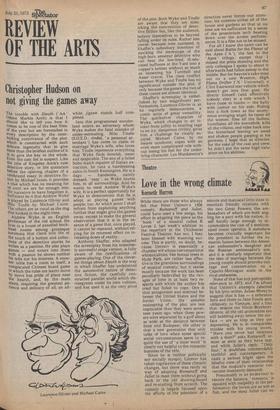Theatre
Love in the wrong climate 41)
Kenneth Hun-en
While there are those who always felt that Peter Ustinov's 1956 comedy, Romanoff and Juliet, could have used a few songs, his effort in adapting the piece as the ' book ' of a musical called R Loves J, last week's addition to the repertory at the Chichester Festival Theatre, has not, I fear, been blessed with stunning success. This is partly, no doubt, because Ustinov is essentially a chamber wit whose conversational whimsicalities, like bonsai trees in Hyde Park, are rather less effective in the grandiose surroundings of musical comedy; but it seems mostly because the work has been peculiarly bedevilled by the ravages of time in at least two respects with which the author has tried but failed to cope. One is that antagonism and mistrust between the United States and the Soviet Union, the amiable mainspring of the plot, are less implacable than they were seventeen years ago, when these powers were separated by a gulf about as wide as the distance between Suez and Budapest; the other is that a new generation that only talks of love when some special social circumstances seem to require the use of 'a nicer word' is clearly not helpful to the romantic business of the title.
Since he is neither politically nor socially myopic, Ustinov has taken cognisance of these climatic changes, but there was really no way of adapting Romanoff and
Juliet to meet them without' going
back to the old drawing board and re-starting from scratc . The comedy is laigely focused upon the efforts of the president of a minute and maniacal little state to maintain friendly relations with the two Great Powers, the ambassadors of which are both angling for a pact with his nation, itself hardly large enough to accommodate the cast of a mediumsized comic operetta. It somehow becomes crucially important for the president to further the romantic liaison between the American ambassador's daughter and the Russian ambassador's son, and it is similarly important that the idea of marriage between the young couple should provoke outrage and consternation on a Capulet-Montague scale in the rival embassies.
None of this has any perceptible relevance to 1973, and I'm afraid that Ustinov's attempts (abetted by his lyric-writer, Julian More) to suggest that it has — a reference here and there to Jane Fonda and, obliquely, to Vietnam, and a hint that, despite the Nixon -Brezhnev detente, all the old animosities are still bubbling away below the surface — are as limp as they are depressing. He is in comparable trouble with his young lovers. "Have you never had relations with a man?" asks Romanoff, almost as soon as they have met, and while Juliet's reply, "Only four," is doubtless commendably truthful and contemporary, it casts a serious blight upon the blissful view, of their relationship that the muSical's romantic convention insistently d mands. PresumaOly in an ndeavour to restore the balance, romance' is equated with insipidity in the performance: the lovers are as wet as fish, and the most Juliet can ex






























 Previous page
Previous page